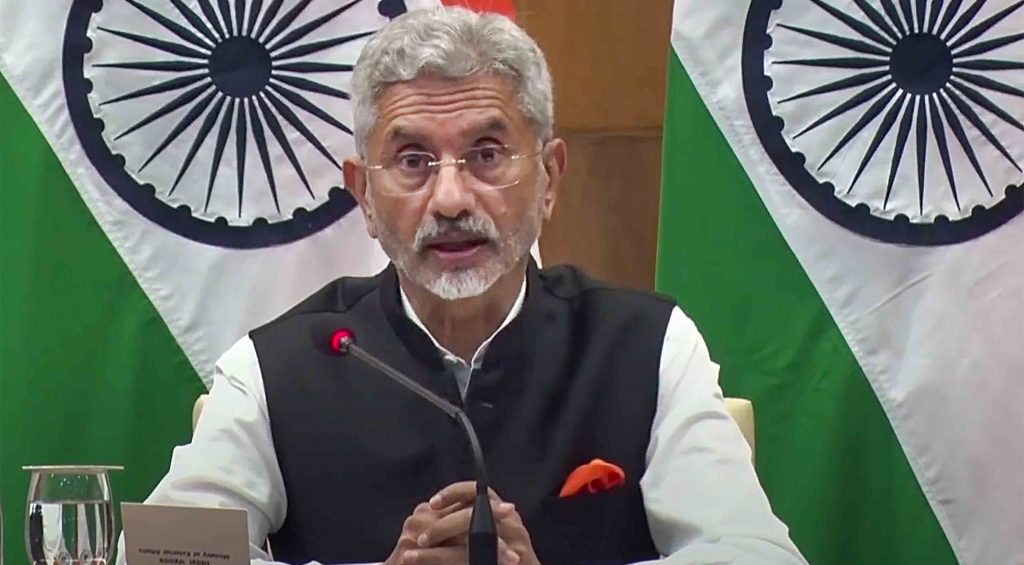Mumbai: Raising many eyebrows, India’s External Affairs Minister S. Jaishankar Friday directly accused the United Nations Security Council (UNSC) of ‘political considerations’ which prevents the global body from acting against terror.
“When it comes to proscribing some of these terrorists, the Security Council has regrettably been unable to act in some cases because of political considerations. This undermines our collective credibility and our collective interests,” Jaishankar said here without mincing words.
He was speaking at an informal briefing of the Counter Terrorism Committee of the UNSC in Mumbai — exactly a month ahead of the upcoming 14th anniversary of the 26/11, 2008 Mumbai terror strikes.
Jaishankar said that while one of the (10) terrorists in that attack was captured alive, prosecuted and convicted by the highest court in India, the key conspirators and planners of the 26/11 terror mayhem remain protected and unpunished.
Without naming any country, the EAM said that “our real tribute to the victims will be to rededicate ourselves to combating and eliminating the menace of terrorism… and this by stronger determination and joint action”, as terrorism poses a serious threat to international peace and security and to the entire humanity.
“We must rise above our political differences to address this scourge. The battle against terrorism must be fought on all fronts, all situations and all places. We cannot be found wanting in our efforts. As the UN Secretary-General stated, ‘Terrorism is pure evil one with which we can never compromise’,” said Jaishankar.
He said it is incumbent on all responsible members of the international community to remember the trauma of every terror victim across the world and to persevere in the efforts to bring the perpetrators of terrorism to justice, and boost the multilateral efforts by the UN to address the terror threat holistically and collectively.
Jaishankar said together “we should send out the message that the international community will never give up on holding terrorists accountable and delivering justice… 26/11 will never ever be forgotten”.
On his part, Jaishankar presented a five-point formula to grapple terror by the horns, with the UN’s coordination with other bodies.
These include targeting ‘terror financing’ to hit back at and counter terrorism with the UN joining hands with others like the FATF and Egmont Group, transparent and effective functioning of the UNSC sanctions to ensure they not rendered worthless for ‘political reasons’.
“Objective and evidence-based proposals for listing of terrorist groups, especially those that curb their access to financial resources must be seen through,” he urged.
Jaishankar sought international cooperation and concerted action against terrorists and their sponsors, by dismantling their safe havens, sanctuaries, training grounds, financial and ideological plus political support structures to weed out the terror plague.
He also said terrorism’s well-established nexus with ‘transnational organised crime, illicit drugs and arms trafficking’ must be recognised and multilateral efforts must be made to break them.
The EAM said over the years, the terror groups have diversified their funding portfolios by exploiting the new or emerging but anonymous technologies like ‘virtual currencies’ for raising funds or financing their activities, more of which will be deliberated in Delhi on Saturday.
He remembered the UNSC’s condemnation of the 26/11 terror attacks — “The Members of the Council underline the need to bring perpetrators, organizers, financiers, and sponsors of these reprehensible acts of terrorism to justice and urged all States to cooperate with the Indian authorities in this regard. All acts of terrorism are criminal and unjustifiable, regardless of their motivation”.
Present at meeting on Friday — held at the Hotel Taj Mahal Palace, one of the sites targeted in the 26/11 terror attacks — were the current UNSC President Michael Moussa Adamo who is also the Foreign Minister of Gabon, UN Under-Secretary-General for Counter-Terrorism Vladimir Voronkov, India’s Permanent Representative to the UN Ruchira Kamboj, Ministers, heads of delegations of the UNSC Member-States and civil society stakeholders from across the world.
IANS
